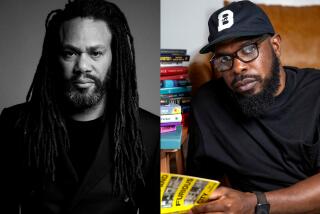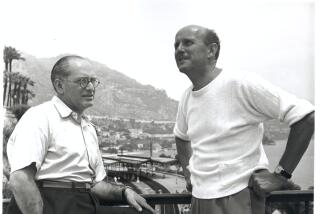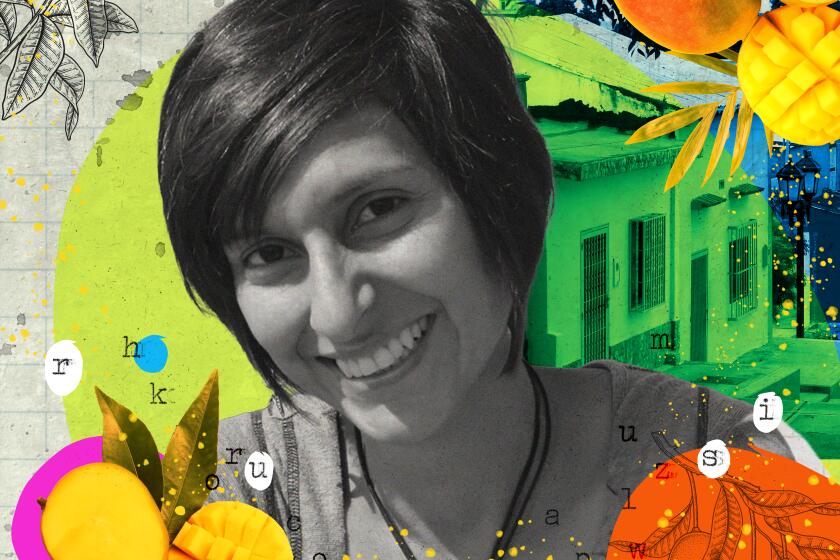Indie spotlight: Pushkin Press
When Wes Anderson’s “The Grand Budapest Hotel” won Oscars for its costumes, makeup, score and production design, it swept something else along in its winning tide: Austrian writer Stefan Zweig. The long-deceased author, who wrote in German, penned the personal stories that were the film’s inspiration. Zweig comes to American bookstores courtesy of Pushkin Press, a British-based publisher focused on modern classics, mostly translated works.
To kick off a new occasional series focusing on independent presses, we turn to Pushkin Press publisher and managing director, Adam Freudenheim. Born in Baltimore, Freudenheim has lived in Britain since 1997. He took over the 15-year-old Pushkin Press three years ago with Stephanie Seegmuller, and the press has undergone major renovations, including expanded offerings and raised visibility. The books can now be found online, of course, and also in bookstores near you. Freudenheim answered my questions by email.
What did you do before launching Pushkin Press?
I took over Pushkin Press in April 2012, with my own money and that of angel investors. But Pushkin was very small with almost no North American presence. In the last three years our turnover has grown more than 800%, and since July 2014 we have been distributed in the U.S. and Canada by Penguin Random House. I was Publisher of Penguin Classics and Modern Classics prior to taking over Pushkin nearly three years ago, overseeing more than 1,500 titles from ancient times to the late 20th century.
What were the plans when Pushkin Press when it was founded in 1997?
Pushkin was founded in 1997 by Melissa Ulfane and for 15 years run by her alone, usually with the help of one or at most two people. Pushkin focused on modern classics in translation from the outset, particularly the work of Stefan Zweig but also that of the Hungarian writer Antal Szerb, translated into English for the first time by Pushkin Press.
Since 2012 I have continued the focus on modern classics in translation but we also now publish a much wider array of contemporary international literary fiction. And we started a children’s imprint -- Pushkin Children’s Books -- in 2013, first U.S. releases in autumn 2014. PCB like the adult list is focused on classic and contemporary children’s books from all over the world, mostly in translation and mostly being published in English by us for the first time, and already accounts for about a third of our turnover.
Stefan Zweig has had a comeback with the success of “The Grand Budapest Hotel.” What did you think of the movie? How did you discover his books? Which of them do you publish?
I first read Stefan Zweig as a teenager, as I lived in Germany for a year as an exchange student. I loved “A Chess Story” and his memoir “The World of Yesterday” at the time and later read much more of his work. As mentioned above, Zweig was one of the first authors republished by Pushkin 18 years ago, and we’ve continued that tradition. Pushkin now has over 25 titles by Zweig in print!
“The Grand Budapest Hotel” is a wonderful film -- smart, funny, evocative and atmospheric, based on the writings of Stefan Zweig and his own life. I think it’s Wes Anderson’s masterpiece, and it’s of course been wonderful as the main English-language publisher of Zweig to see what a dramatic increase in interest in Zweig’s writings the film has generated. We were lucky enough to collaborate with Wes Anderson on a little book of Zweig’s writings selected by Anderson and with an introductory conversation between him and Zweig’s latest biographer, George Prochnik. This book “The Society of the Crossed Keys” came out everywhere except in the USA, unfortunately, in February 2014.
Does humorous fiction have a harder time being designated “classic” than fiction that is serious or dramatic?
Yes, definitely. There is of course great classic comic fiction -- think Swift or Thackeray, or more recently Waugh and Kingsley Amis. But these are probably the exceptions. The unusual thing about “The Grand Budapest Hotel” is that -- unlike Zweig’s writings themselves! -- it is very funny most of the time, yet it still feels imbued with Zweig’s spirit.
What are some of the biggest challenges of publishing works in translation?
I don’t believe they are much greater than the general challenges facing publishers today -- particularly of fiction. English-speaking audiences are more open than ever to reading books from all over the world, and there have been any number of recent successes of books in translation even though 95% of books published in English are not translations. But we’re working on changing that – one book at a time!
How many books will you publish in 2015?
24 adult titles and 12 children’s titles (not all of them will be released in the USA due to rights restrictions).
What are some highlights?
One of my personal favorites is a new translation of Isaac Babel’s “Red Cavalry” stories from the 1920s, out in the U.S. in May 2015. It’s an incredible book and has long suffered from inferior translations -- our new translation is brilliant. The translator, Boris Dralyuk, taught at UCLA for many years until decamping to Scotland this January, so there’s an L.A.-connection there too.
We’re all thrilled to be publishing several books by Erwin Mortier -- his U.S. debut -- the most lauded contemporary Flemish writer. His novel of the great war, “While the Gods Were Sleeping,” has been translated into a number of languages and was a bestseller in Belgium and the Netherlands. We’re publishing 5 of his books.
Tomas Gonzalez, the Colombian writer, makes his English-language debut with “In the Beginning was the Sea.”
And we are publishing the first and second volumes in Robert Merle’s epic, swashbuckling historical fiction series Fortunes of France with “The Brethren” followed later in the year by “City of Wisdom and Blood.”
Do you see a difference between the books American and British readers respond to?
Generally speaking, no. Particularly in regards to fiction, I would say they are nearly identical in terms of taste -- and sales generally bear this out. There are of course individual titles now and again that work in one market but not another, but broadly speaking there isn’t a huge difference in taste.
How have e-books played a role in your business?
Business as usual, really. We release e-books of 9 out of 10 of our titles simultaneous with the print versions. The advantage of course is e-books never go out of print or out of stock and there are no distribution costs. That said, 90% of our sales still come from print books at the moment. There are particular titles that surge as e-books -- usually when they are heavily discounted in promotions, to be honest -- but print is our bread and butter.
More to Read
Sign up for our Book Club newsletter
Get the latest news, events and more from the Los Angeles Times Book Club, and help us get L.A. reading and talking.
You may occasionally receive promotional content from the Los Angeles Times.







